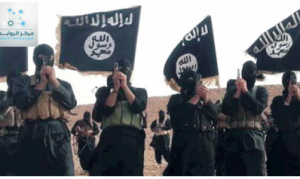Dr.Salim M.Al Zanoon
1. Guerrilla warfare.
The replacement of the policy of control over the land and the regular war by the guerrilla warfare strategy, as to control of the land is no longer important as it contributes mainly to the process of targeting the organization, and does not have the ability to regular war, which proved its defeat, so ISIS replaced it by guerrilla warfare, located in specific areas such as desert areas and outskirts of Cities without control, and carrying out lightning strikes, targeting infrastructure such as agricultural crops and power plants in Iraq, and the use of a network of tunnels in the desert areas to the northwest of Anbar and to the south of Mosul, Iraq.
2. Employment of social structure, women.
The organization works to employ family, tribal and clan relations individually. Every member of the organization must return to the tribe, clan and family to obtain some help and support from their relatives, helping them to continue and survive.
Women have been an active component in the continuation of the organization’s work and survival. In recent months, the recruitment of women to work in the organization has increased. The Tunisian security establishment has discovered a network for the recruitment and smuggling of girls into the ranks of the organization in Syria and Libya, 40% of them have an academic culture. The Iraqi government accused dozens of women with logistical assistance to the organization and help in carrying out the operations of organization.
3. Redeployment of troops.
The organization worked after successive defeats on the redeployment and deployment of forces in remote areas and unstable states, highlighted by the deployment of troops in the desert southeast of Syria, the desert areas to the northwest of Anbar, south of Mosul in Iraq, and southern Libya after exiting from Darna and Beni Ghazi, and on the level of countries the spread in Yemen, Aden, Afghanistan and the regions adjacent to Tajikistan and Turkmenistan in an attempt to expand to the Central Asian countries, and statistics indicate the presence of about 2000 Russians and about 4500 citizens from Central Asian countries fighting in the ranks of “Da’ash” in Syria .
4. Creating new sources of finance.
The organization has worked to find alternatives to previous oil-based sources of finance, taxes on the local population and trafficking in women. The new sources of funding are based on the smuggling of people, goods, commodities and oil derivatives, and the focus on cross-border drug production and traffickers. In this context, Russia called at the Shanghai summit in the last June to fight the terrorist threat in Afghanistan in a coordinated manner by repelling drug production and trafficking.
5. Activation of dormant cells.
The organization came out from some areas but left some dormant cells to preserve the organization’s ideology and use it when needed , after the organization left Benghazi in Libya, on March 10 , the organization blew up a car bomb at a checkpoint of the Haftar forces in the south of the city of Ajdabiya near Benghazi, as well as a car bomb in the south of the city of Kirkuk on July 1, and sleeping cells of the organization were dismantled in Tunisia, Morocco and Lebanon.
The organization has been subjected to successive defeats and the end of control over the land. However, the organization is still able to work through the adoption of mechanisms and approaches of adaptation after defeat. This requires from countries the creation of new mechanisms for confrontation not only for military action but also for intelligence cooperation in the face of new sources of funding and intellectual and religious confrontation and the formulation of comprehensive inter-State awareness programs.
Rawabet Center for Research and Strategic Studies

